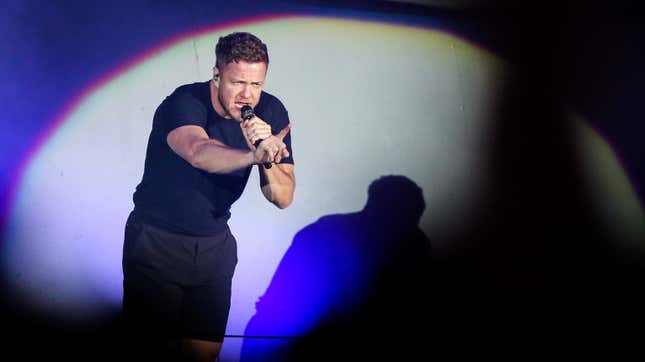

Billboard has published their top rock songs of the decade, and the results are grim: The 10 slots are dominated by Twenty-One Pilots and Imagine Dragons, with “High Hopes” (Pete’s impact), “Hey Ho,” “Shut Up and Dance,” and that-one-Portugal-the-Man-song rounding out the top 10. Naturally, rock fans on Twitter are losing it. Yet Billboard measures what’s being bought, what’s being streamed, and what’s being played on the radio, not what’s actually good (“Thrift Shop” by Macklemore topped the hip-hop list, go figure). It’s not a critical ranking, it’s a collection of data points that shows Americans have somehow spent the decade listening to “Radioactive” on loop without wanting to rip their ears off.
A brief perusal of top tracks from the 2000s, for example, indicates that it was a decade dominated by various nu-metal flavors of the week with Green Day and Foo Fighters thrown in. Anyone who listened to their local alt-rock radio station can remember hearing all the singles from American Idiot making the rounds while Staind, Trapt, and Puddle of Mudd would battle for a quest for dominance. Billboard’s end of the decade roundup from the 2000s in many ways would look like rock was represented largely by Avenged Sevenfold and 3 Doors Down. In terms of music sales, sure—but cultural significance, not so much. While nu-metal and its adjacent stylings were certainly part of the story, rock in the 2000s is also remembered for the mainstreaming of pop-punk and emo, not to mention post-punk revival, garage rock, and the British Indie Rock Invasion. By decade’s end, the indie label itself was so coveted and overused that it became just as vague and meaningless as “alt-rock.”
So what’s the difference? Rock of the 2000s wasn’t defined by Trapt, so why should anyone feel verklempt over Billboard’s Imagine Dragons- and Twenty-One Pilots-heavy list? The difference is that in the last decade, rock has been sidelined for other genres in a way that it simply wasn’t in the 2000s, when it still had a kind of cultural relevance outside of what was selling. Emo bands were signed to major labels, rock stars were dating actors and models and received paparazzi treatment, and bands like Yeah Yeah Yeahs and The Strokes could get airplay on MTV. Plus, rock in the 2000s rarely felt static; I started the decade listening to Linkin Park and Blink 182 and ended it listening to Phoenix and Animal Collective. Meanwhile, one of my biggest critiques with rock in the 2010s is how it feels like so little has actually evolved, even among less mainstream darlings. It largely felt like one long lo-fi, bedroom pop Mac DeMarco bender, and I say this as someone who loves lo-fi bedroom pop and at least two Mac DeMarco albums.
I’ve spent the last few years talking about this phenomenon with friends, about why rock as a genre has flopped so hard this decade despite the fact that there are still plenty of great rock bands out and about. Of course, this could just be a matter of changing tastes after a decade of hip hop and EDM’s chokehold on the music industry. Perhaps rock didn’t make as seamless a leap into the streaming and algorithm-centric way people consumed music during the 2010s. Maybe nobody knows how to play the guitar anymore.
I still go to shows, hoping to be pushed around in a pit, desperate to feel something. I saw a London-based band called Shame perform in Brooklyn and Los Angeles back in 2018, and I was moved by how much their performance made me believe in this genre and its ability to be fun, moving, energetic, and accessible again. I’m rooting for them as we enter the next decade. They deserve recognition beyond a small group of tastemakers, as so many rock bands do. And at the very least, we deserve to have another decade where a group can play a popular rock song in a crowded room and everyone knows the words, and not just because of a cursed political meme.
With rock less relevant than ever, and major labels gaming streaming numbers, it’s naturally harder for smaller rocks bands—bands that are not of the Imagine Dragons and Twenty-One Pilots persuasion—to ever hope of pushing through and gaining a sliver of attention. The true legacy of rock in the 2010s isn’t that it’s dead, but that it’s truly been pushed underground. It’s perhaps what some purists have always wanted, but it comes at a cultural and financial cost.
But at least no one can sell out anymore, right?